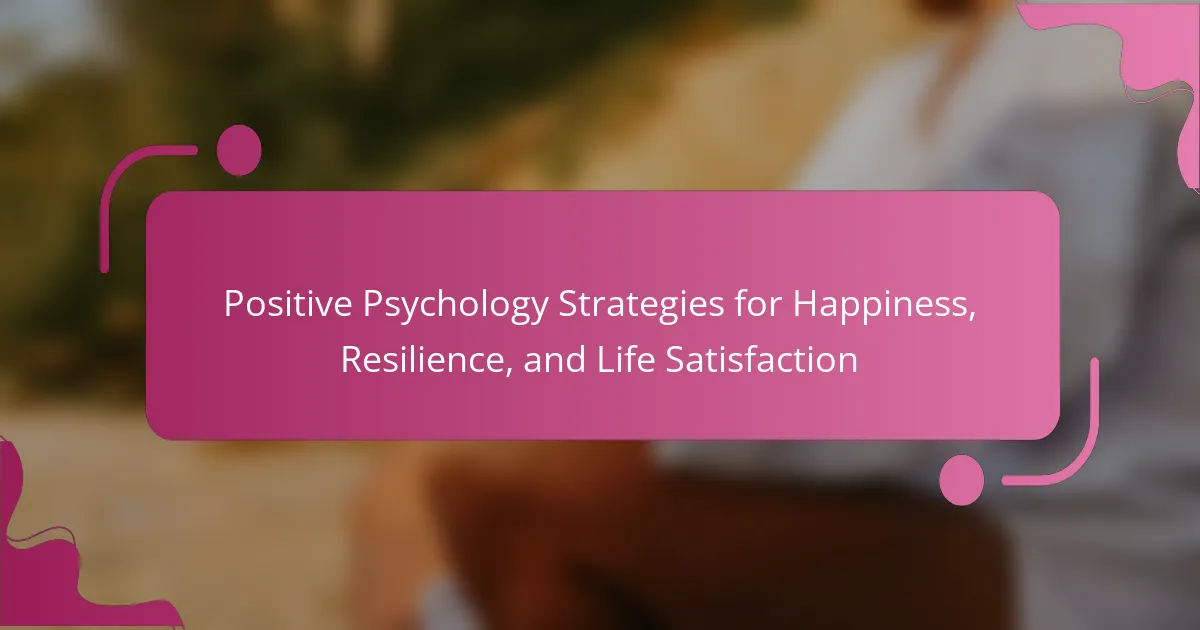Positive psychology strategies significantly enhance happiness, resilience, and life satisfaction. Techniques such as gratitude journaling, mindfulness practices, and strengths identification empower individuals to cultivate a more optimistic outlook. Research shows that these strategies lead to measurable increases in overall well-being, reduce stress, and improve emotional regulation. By focusing on personal strengths and fostering social connections, individuals can create a more fulfilling and joyful life.
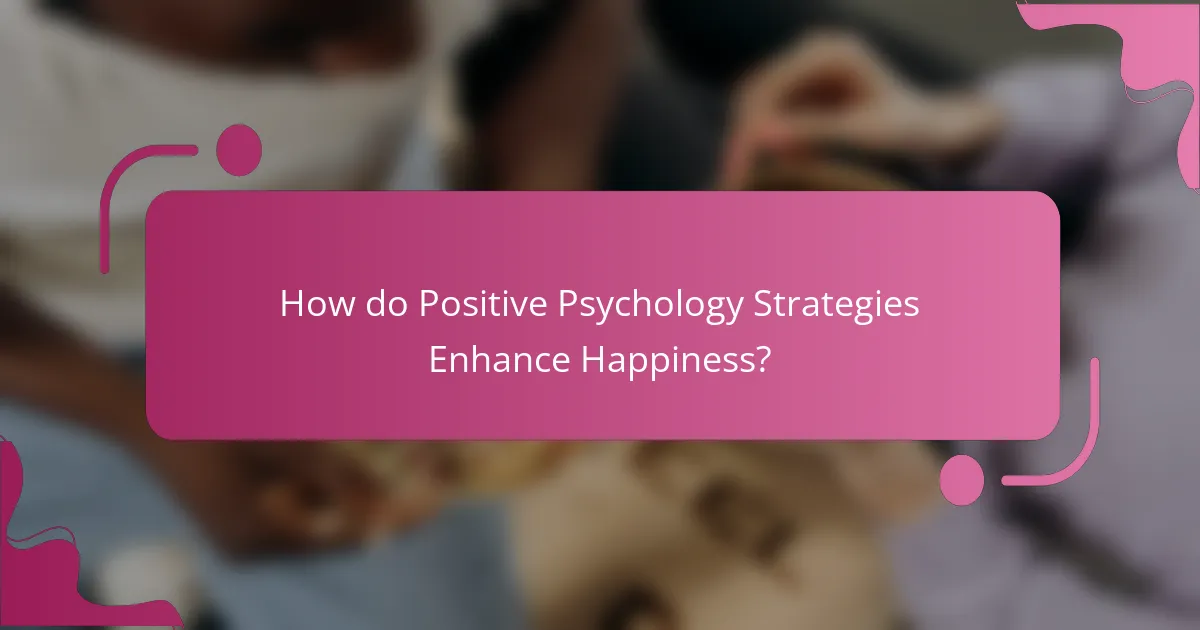
How do Positive Psychology Strategies Enhance Happiness?
Positive psychology strategies significantly enhance happiness by fostering positive emotions, resilience, and life satisfaction. Techniques such as gratitude journaling, mindfulness practices, and strengths identification empower individuals to cultivate a more optimistic outlook. Research shows that engaging in these strategies can lead to measurable increases in overall well-being. For instance, individuals practicing gratitude report higher levels of happiness and lower levels of depression. By focusing on positive experiences and personal strengths, people can create a more fulfilling and joyful life.
What are the Key Components of Happiness in Positive Psychology?
Key components of happiness in positive psychology include positive emotions, engagement, relationships, meaning, and achievement. These elements contribute to overall well-being and life satisfaction. Positive emotions enhance resilience, while strong relationships provide support. Engagement in activities fosters flow, and finding meaning boosts purpose. Achievement reflects personal growth and fulfillment.
Which Techniques Foster Positive Emotions?
Positive emotions can be fostered through various techniques such as mindfulness, gratitude practices, and social connections. Mindfulness enhances awareness and reduces stress, while gratitude practices increase overall life satisfaction. Social connections provide support and boost resilience.
How Can Mindfulness Practices Improve Well-Being?
Mindfulness practices significantly enhance well-being by promoting emotional regulation and reducing stress. These techniques foster resilience, leading to improved happiness and life satisfaction. Regular mindfulness can increase self-awareness, allowing individuals to better manage their thoughts and emotions. Research indicates that mindfulness meditation can lead to a reduction in anxiety levels by up to 30%, contributing to a more positive outlook on life.
What Role Does Gratitude Play in Happiness?
Gratitude significantly enhances happiness by fostering positive emotions and social connections. It encourages individuals to appreciate their lives, leading to increased life satisfaction. Studies indicate that practicing gratitude can improve overall well-being and resilience. For example, people who regularly express gratitude report lower levels of depression and higher levels of optimism. This unique attribute of gratitude as a psychological tool makes it a vital component in positive psychology strategies for happiness.
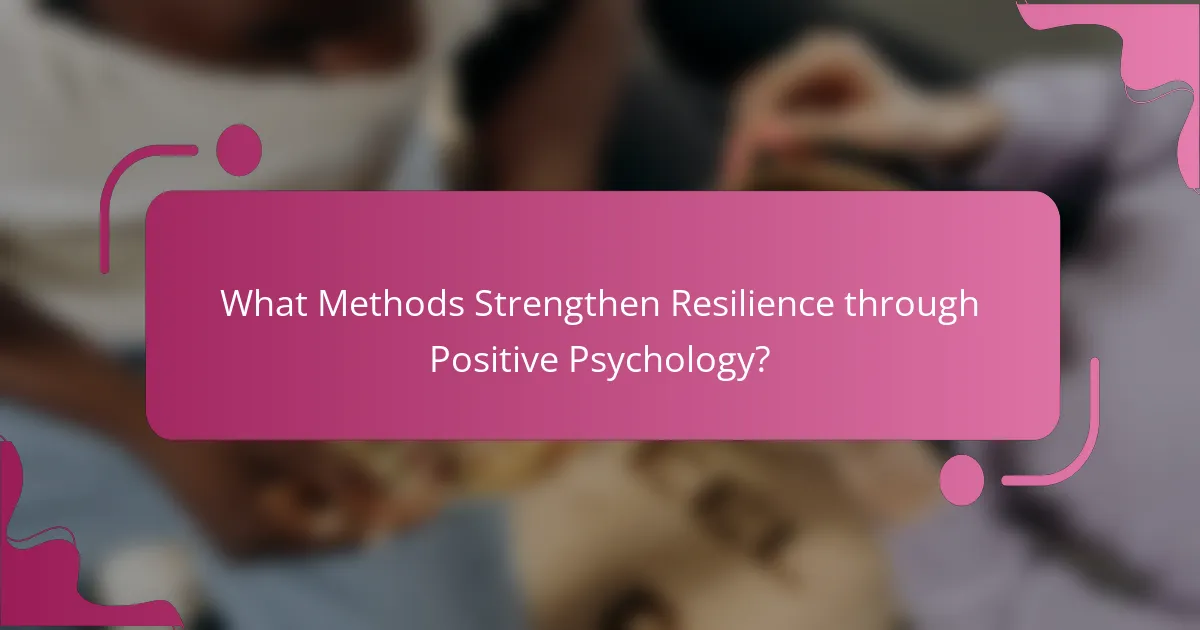
What Methods Strengthen Resilience through Positive Psychology?
Positive psychology enhances resilience through various strategies. Key methods include cultivating gratitude, practicing mindfulness, and fostering social connections.
Gratitude exercises, such as daily journaling, can significantly reduce stress and improve overall well-being. Mindfulness practices, like meditation, help individuals stay grounded and manage anxiety. Strengthening social ties through supportive relationships provides emotional resources during challenging times.
Incorporating these strategies can lead to increased life satisfaction and a more resilient mindset.
How Does Cognitive Behavioral Therapy Support Resilience?
Cognitive Behavioral Therapy (CBT) enhances resilience by teaching individuals to identify and challenge negative thought patterns. This process fosters a more adaptive mindset, enabling better coping strategies during stress. Research shows that CBT effectively increases emotional regulation and self-efficacy, crucial components for resilience. By focusing on actionable skills, CBT empowers individuals to navigate life’s challenges with greater confidence and optimism.
Which Resilience-Building Exercises are Most Effective?
Resilience-building exercises such as mindfulness meditation, cognitive reframing, and gratitude journaling are most effective. These strategies enhance emotional regulation and increase overall life satisfaction. Mindfulness meditation improves focus and reduces stress. Cognitive reframing helps shift negative thought patterns into positive ones. Gratitude journaling fosters appreciation and enhances well-being. Engaging in these practices regularly can significantly bolster resilience.
How Can Social Connections Enhance Resilience?
Social connections significantly enhance resilience by providing emotional support and fostering a sense of belonging. They create networks that help individuals cope with stress and adversity. Strong relationships can lead to improved mental health outcomes, reducing feelings of isolation and depression. Engaging with supportive communities can also encourage personal growth and adaptability in challenging situations.
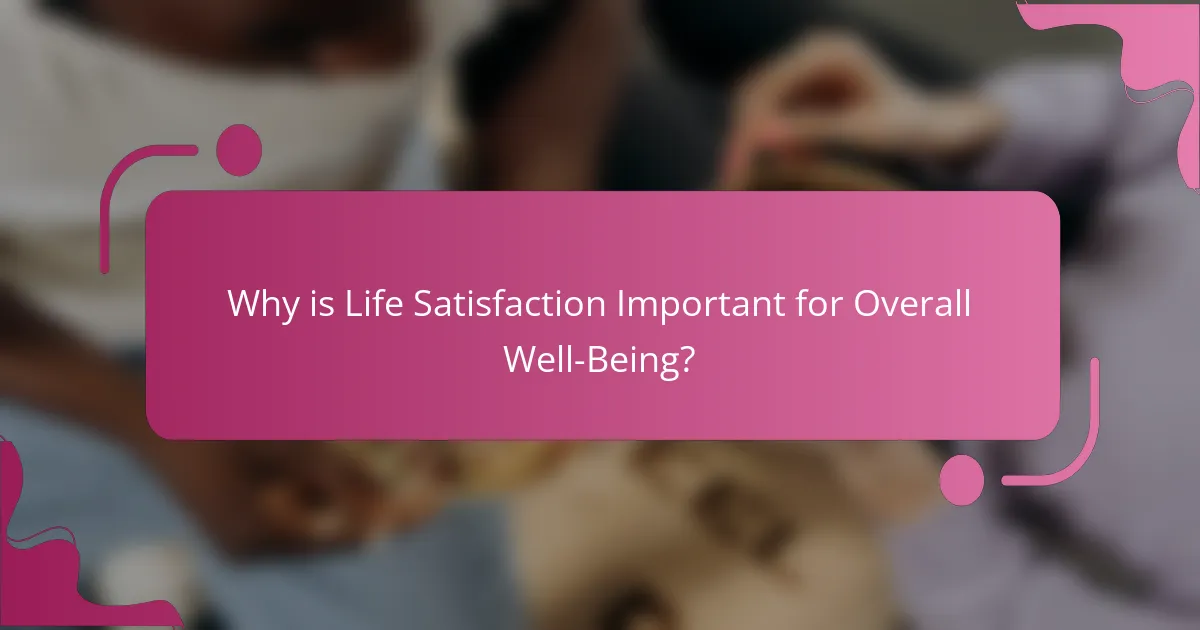
Why is Life Satisfaction Important for Overall Well-Being?
Life satisfaction is crucial for overall well-being as it directly influences mental health and resilience. Higher life satisfaction correlates with lower levels of stress and anxiety. Research shows that individuals with greater life satisfaction experience improved physical health, stronger relationships, and enhanced productivity. Positive psychology strategies, such as gratitude practices and mindfulness, can significantly boost life satisfaction, creating a cycle of happiness and resilience. Prioritizing life satisfaction fosters a fulfilling life and contributes to long-term well-being.
What Factors Contribute to Life Satisfaction in Different Cultures?
Cultural factors significantly influence life satisfaction through values, social connections, and coping mechanisms. For instance, collectivist cultures prioritize community and relationships, enhancing overall happiness. In contrast, individualistic cultures emphasize personal achievement, impacting life satisfaction differently. Economic stability and access to education also play crucial roles across cultures, affecting overall well-being.
How Can Goal Setting Improve Life Satisfaction?
Goal setting significantly enhances life satisfaction by providing direction and a sense of purpose. It fosters motivation and encourages personal growth. Research indicates that individuals who set specific, measurable goals experience higher levels of happiness and fulfillment. This process helps individuals track progress and celebrate achievements, reinforcing positive behaviors. Furthermore, goal setting cultivates resilience by enabling individuals to navigate challenges effectively, leading to a more satisfying life overall.
What Impact Does Physical Health Have on Life Satisfaction?
Physical health significantly influences life satisfaction by enhancing mood and resilience. Individuals with good physical health often experience higher levels of happiness and lower rates of anxiety. Research indicates that regular exercise improves mental well-being, leading to increased life satisfaction. Additionally, healthy eating contributes to better emotional regulation and cognitive function, further boosting overall happiness. Prioritizing physical health through consistent activity and nutrition can create a positive feedback loop, enhancing life satisfaction over time.
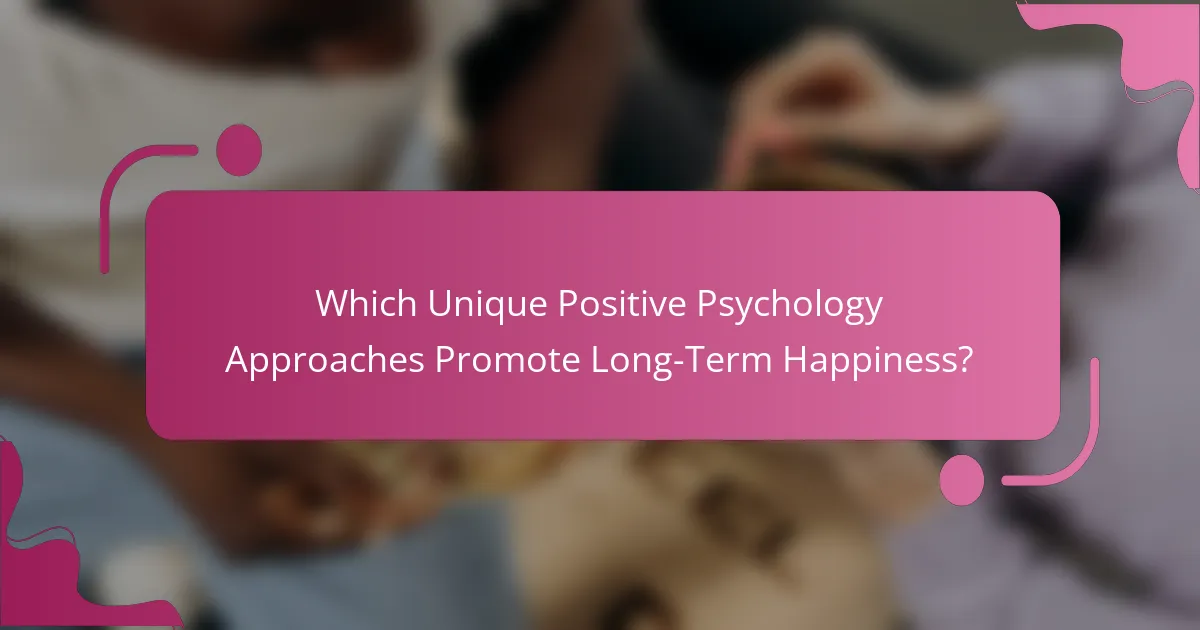
Which Unique Positive Psychology Approaches Promote Long-Term Happiness?
Positive psychology approaches that promote long-term happiness include gratitude practices, mindfulness meditation, and strengths-based interventions. These strategies enhance emotional well-being and foster resilience over time.
Gratitude practices encourage individuals to recognize and appreciate positive aspects of life, leading to increased life satisfaction. Mindfulness meditation cultivates present-moment awareness, reducing stress and enhancing emotional regulation. Strengths-based interventions focus on identifying and leveraging personal strengths, which boosts confidence and fulfillment.
Research shows that individuals who regularly practice gratitude report higher levels of happiness. Mindfulness meditation has been linked to improved mental health outcomes, including reduced anxiety. Strengths-based approaches contribute to greater resilience, allowing individuals to navigate life’s challenges more effectively.
How Do Character Strengths Influence Personal Development?
Character strengths significantly enhance personal development by fostering happiness, resilience, and life satisfaction. These strengths, such as courage, empathy, and perseverance, empower individuals to navigate challenges effectively.
Research shows that individuals who identify and utilize their character strengths experience greater well-being and fulfillment. For example, a study found that leveraging personal strengths in daily activities leads to increased life satisfaction and reduced stress levels.
Moreover, character strengths contribute to resilience by enabling individuals to cope with adversity. People who exhibit strengths like optimism and social intelligence are better equipped to recover from setbacks.
In summary, recognizing and applying character strengths is essential for personal growth, promoting a more satisfying and resilient life.
What is the Role of Flow in Enhancing Life Satisfaction?
Flow significantly enhances life satisfaction by promoting engagement and fulfillment in activities. When individuals experience flow, they become fully immersed in tasks that align with their skills and interests, leading to increased happiness. Research indicates that people who regularly engage in flow-inducing activities report higher levels of life satisfaction. This state not only fosters resilience but also contributes to personal growth and well-being. For instance, activities like sports, art, or challenging work can create flow experiences that enhance overall quality of life.
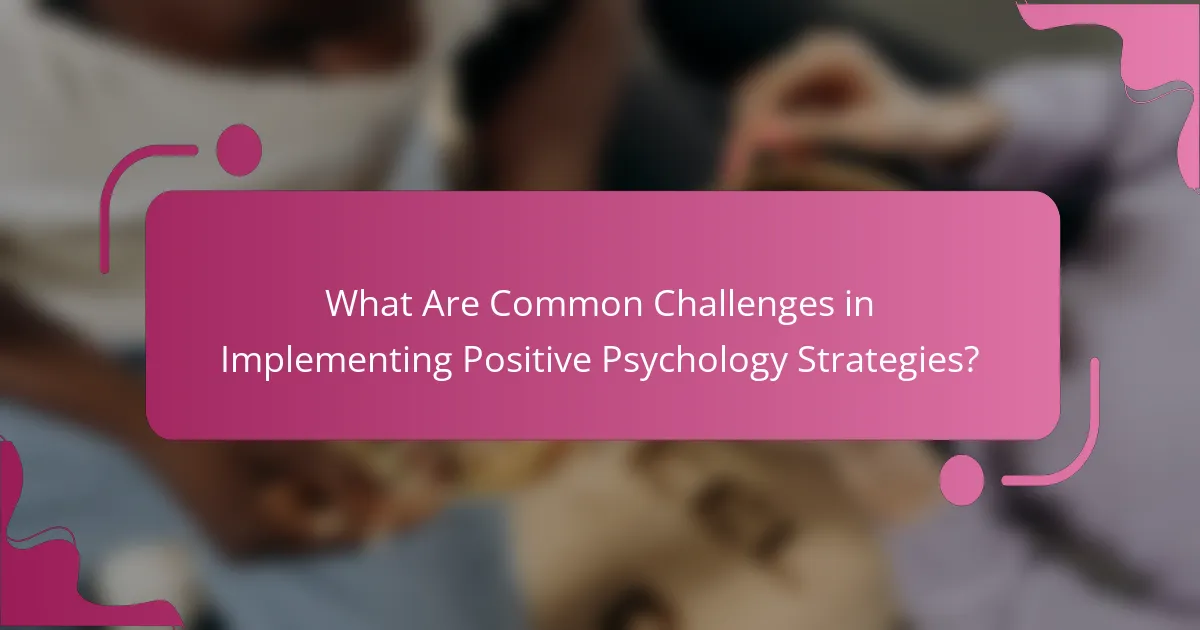
What Are Common Challenges in Implementing Positive Psychology Strategies?
Common challenges in implementing positive psychology strategies include resistance to change, lack of training, and insufficient resources. These obstacles can hinder the effective adoption of practices aimed at enhancing happiness and resilience. Resistance often stems from skepticism about the benefits of positive psychology. Lack of training can prevent practitioners from applying strategies effectively. Additionally, limited resources may restrict access to necessary tools and support. Addressing these challenges is essential for fostering a culture of well-being.
How Can Individuals Overcome Barriers to Happiness?
Individuals can overcome barriers to happiness by implementing positive psychology strategies. These strategies include practicing gratitude, fostering social connections, and engaging in mindfulness.
Gratitude enhances well-being by shifting focus from negative to positive aspects of life. Studies show that regularly acknowledging what one is thankful for can significantly boost life satisfaction.
Building social connections is crucial for resilience. Supportive relationships provide emotional backing, which helps individuals navigate challenges more effectively. Engaging in community activities can strengthen these bonds.
Mindfulness practices, such as meditation, promote present-moment awareness. Research indicates that mindfulness reduces stress and increases overall happiness by encouraging individuals to appreciate their current experiences.
What Mistakes Should Be Avoided in Positive Psychology Practices?
To enhance positive psychology practices, avoid common mistakes that can hinder effectiveness. Focusing solely on positive emotions can lead to neglecting important negative feelings. Ignoring individual differences in responses to strategies may result in ineffective applications. Overemphasis on gratitude without fostering deeper self-awareness can limit growth. Lastly, failing to integrate evidence-based approaches can compromise the overall impact of positive psychology strategies.
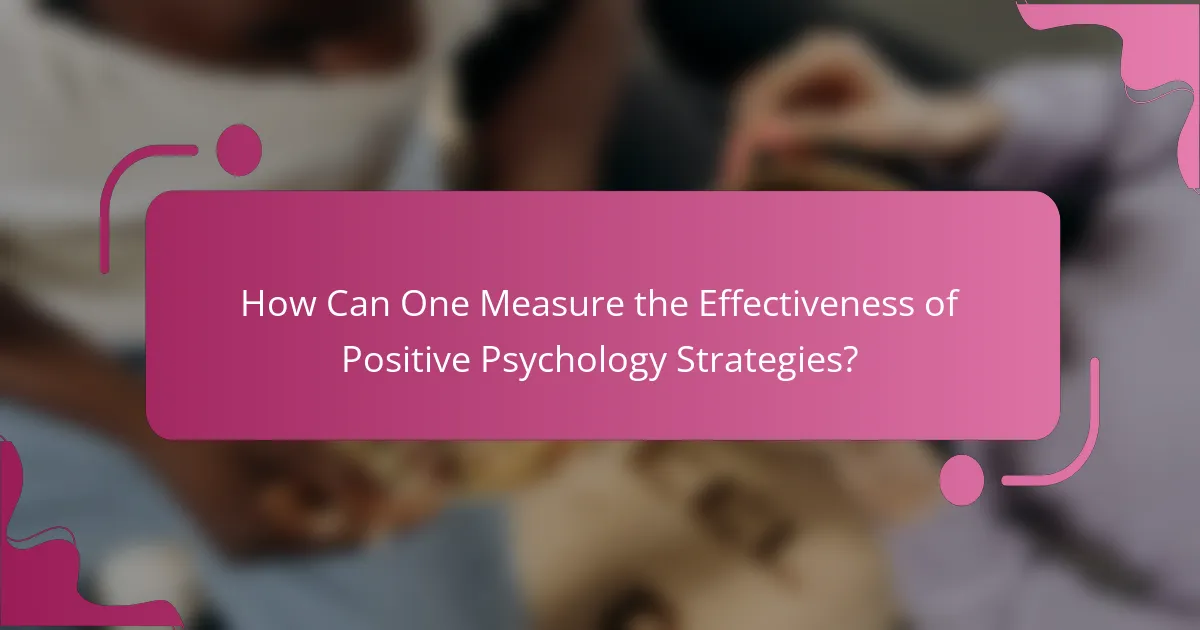
How Can One Measure the Effectiveness of Positive Psychology Strategies?
To measure the effectiveness of positive psychology strategies, one can use various assessment tools and metrics. Surveys and questionnaires, such as the Satisfaction with Life Scale, can quantify happiness and life satisfaction. Additionally, tracking resilience through self-report scales, like the Connor-Davidson Resilience Scale, provides insight into personal growth. Regularly monitoring changes in emotional well-being, stress levels, and social connections can also indicate the impact of these strategies. Engaging in qualitative assessments, such as personal reflections or interviews, can further enrich understanding of the strategies’ effectiveness.
What Metrics Are Used to Assess Happiness and Life Satisfaction?
Metrics used to assess happiness and life satisfaction include subjective well-being scales, life satisfaction surveys, and psychological assessments. These tools measure various attributes such as emotional responses, life evaluations, and overall contentment. Commonly used metrics are the Satisfaction with Life Scale (SWLS), Positive and Negative Affect Schedule (PANAS), and the World Happiness Report rankings. Each provides unique insights into individual and societal happiness levels, helping to identify factors that contribute to resilience and life satisfaction.
How Can Feedback Loops Improve Personal Growth?
Feedback loops enhance personal growth by promoting self-awareness and continuous improvement. They allow individuals to reflect on experiences, identify strengths, and address weaknesses effectively. Utilizing feedback loops fosters resilience, as individuals learn to adapt and thrive amid challenges. Moreover, integrating positive psychology strategies can amplify the benefits of feedback by reinforcing a growth mindset and enhancing overall life satisfaction.
What Best Practices Should Be Followed for Optimal Results?
To achieve optimal results in positive psychology, follow these best practices: cultivate gratitude, practice mindfulness, set achievable goals, and foster social connections. These strategies enhance happiness, resilience, and life satisfaction.
1. Cultivate gratitude: Regularly express appreciation to improve overall well-being.
2. Practice mindfulness: Engage in present-moment awareness to reduce stress and increase emotional regulation.
3. Set achievable goals: Establish clear, realistic objectives to boost motivation and a sense of purpose.
4. Foster social connections: Build and maintain supportive relationships to enhance feelings of belonging and support.
